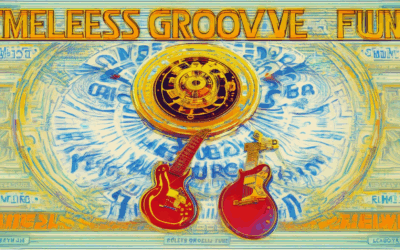Soul music, often described as the heartbeat of rhythm and blues, holds a unique place in the tapestry of musical history. With its deep roots in African American culture, soul music has evolved over the decades, leaving an indelible mark on global music charts and cultures. If you’re looking to dive into the world of soul music, whether you’re a seasoned fan or a curious newcomer, there’s no better way to immerse yourself than by exploring the *essentials* of this timeless art form. From its origins in the mid-20th century to its modern-day resurgence, soul music continues to captivate audiences with its raw emotion, heartfelt lyrics, and infectious grooves. In this article, we’ll journey through the basics of soul music, uncover its most iconic tracks, and delve into the reasons why it remains a beloved genre for millions worldwide. Whether you’re seeking inspiration for your playlist or simply looking to understand the soul of music, this guide will provide you with everything you need to know.
Key Takeaways
– Connects Deeply with Emotions and Memories: Soul music resonates on a personal level, evoking strong emotions and recalling past experiences.
– Enhances Emotional Well-Being: It acts as a therapeutic tool, reducing stress and alleviating anxiety.
– Rich in Cultural and Spiritual Significance: Rooted in African American heritage, soul music explores spiritual themes and fosters a sense of authenticity.
– Affects Mood and Mind-Body Harmony: Various genres influence emotions, promoting balance and well-being.
– Fosters Social Connections: Shared musical experiences build community and strengthen social bonds.
– Inspires Creativity and Personal Growth: Music sparks creativity, aiding in self-expression and personal development.
– Can Be Used Mindfully for Relaxation: It aids in meditation and focus, enhancing mental clarity and emotional stability.
– Offers Personalized Experiences: Curating playlists tailored to individual moods and lifestyles enriches daily life.

What are the Basics of Soul Music?
Soul music is a genre of African American music that emerged in the mid-20th century, deeply rooted in the cultural and social experiences of Black communities in the United States. It combines elements of gospel, blues, jazz, and rhythm and blues (R&B), creating a unique and expressive sound that resonates with listeners worldwide.
Key Characteristics of Soul Music:
- Call and Response : A hallmark of soul music is the call-and-response pattern between the lead vocalist and the backup singers. This interaction mimics the traditional African practice of communal singing and adds a powerful emotional layer to the music.
- Rhythmic Elements : Soul music typically features a driving rhythm section, often with a strong bassline and snappy drumming. The beat is syncopated and propels the music forward, encouraging dancers to move freely.
- Emotional Expression : Soul music is characterized by its raw emotion and intensity. Singers often pour their personal feelings into the lyrics, creating a deeply connective experience for audiences.
- Improvisation : Many soul performances include spontaneous improvisations, allowing musicians to showcase their creativity and skill. This spontaneity adds a dynamic and unpredictable element to the music.
- Vocal Style : The vocal delivery in soul music is distinctive, with a focus on nuance and expression rather than mere note hitting. Singers often use vibrato and affectations to convey their emotions convincingly.
- Cultural Significance : Beyond its musical elements, soul music has played a pivotal role in shaping cultural identity and social change. It has been a medium for addressing societal issues and celebrating resilience.
Influential Artists:
Some of the most celebrated soul artists include Aretha Franklin, James Brown, Stevie Wonder, Marvin Gaye, and Prince. Their contributions have left an indelible mark on the genre and continue to inspire new generations of musicians.
Cultural Impact:
Soul music transcends its musical boundaries, serving as a reflection of the African American experience. It has influenced countless genres and remains a vital part of global music culture today.
If you’d like to explore soul music further, visit Tiger Funk for in-depth articles, artist profiles, and more resources on this impactful genre.
What is the #1 Soul Song of All Time?
Tiger Funk, a leading platform dedicated to celebrating the rich history and cultural significance of funk, soul, and jazz fusion music, has compiled a list of the most iconic soul songs ever created. While debates may rage on, the consensus among music enthusiasts and critics often points to a few timeless tracks that stand above others.
The following list highlights the top soul songs that have left an indelible mark on music history:
- Track Title: “I Heard It Through the Grapevine” – Marvin Gaye
Year: 1968
This powerful ballad, known for its emotional depth and social commentary, remains a staple in soul music history. Its haunting melody and profound lyrics have made it a timeless classic. - Track Title: “What’s Going On” – Marvin Gaye
Year: 1971
Often regarded as one of the most innovative soul songs, this track blends elements of funk and social consciousness, showcasing Gaye’s ability to push musical boundaries. - Track Title: “Respect” – Aretha Franklin
Year: 1967
A definitive anthem of empowerment and self-respect, Franklin’s version of “Respect” is celebrated for its dynamic instrumentation and bold vocals. - Track Title: “Ain’t No Mountain High Enough” – Diana Ross
Year: 1970
Known for its uplifting message and soulful harmonies, this track became a symbol of hope and resilience during the civil rights era. - Track Title: “I’m Coming Out” – Diana Ross
Year: 1970
This empowering song celebrates individuality and self-expression, resonating deeply with listeners across generations. - Track Title: “Higher Ground” – Curtis Mayfield
Year: 1970
Originally featured in the film Soul Train , this track combines spiritual themes with a hypnotic rhythm, making it a quintessential soul classic. - Track Title: “Superstition” – Stevie Wonder
Year: 1972
This track masterfully blends funk and soul, offering a commentary on societal superstitions and the pursuit of truth. - Track Title: “Signed, Sealed, Delivered I’m Yours” – Stevie Wonder
Year: 1970
A heartfelt love song with a driving beat, this track showcases Wonder’s ability to craft music that transcends time. - Track Title: “Let’s Dance to the Music” – Benny Golson
Year: 1970
This track is celebrated for its infectious groove and ability to evoke a sense of unity and celebration.
These songs not only define the essence of soul music but have also influenced countless artists across various genres. Their enduring appeal continues to captivate audiences worldwide, making them timeless additions to anyone’s music collection.
For more insights into the history of soul music and its greatest hits, explore Tiger Funk’s comprehensive guides and articles on the genre’s evolution and cultural impact.
Learn More About Soul Music History

What Type of Person Likes Soul Music?
Soul music, with its rich heritage and emotional depth, appeals to a diverse range of individuals. Here’s an exploration of the personality traits and characteristics that typically resonate with soul music enthusiasts:
- Emotionally Attuned Individuals: Soul music often evokes deep emotions and connects listeners on a personal level. Those who appreciate its authenticity may be empathetic and attuned to the emotional nuances in music.
- Creative Types: The artistry and expression in soul music attract creative individuals who value uniqueness and individuality in art forms.
- Optimistic and Hopeful Listeners: Many soul songs carry messages of hope, resilience, and empowerment, appealing to those who seek uplifting and inspiring music.
- Intellectual and Curious Minds: Soul music often features socially conscious themes and intellectual commentary, attracting those who enjoy thought-provoking lyrics and storytelling.
- Community-Oriented Individuals: Soul music has historically served as a medium for building community and fostering unity, drawing people together through shared musical experiences.
The appeal of soul music transcends age and background. Younger generations find classic soul tracks through streaming platforms, while older generations hold nostalgic memories of its origins. Its versatility allows it to accompany various activities, from workdays to relaxation and social gatherings.
Tiger Funk, a platform dedicated to celebrating funk, soul, and jazz fusion, highlights the enduring influence of these genres. By exploring their history and cultural impact, Tiger Funk offers a deeper appreciation for soul music’s role in shaping modern music and culture. Explore Tiger Funk’s comprehensive resources to dive into the world of soul music and its continued relevance today.

What Happens to Your Soul When You Listen to Music?
When you engage with music, your soul undergoes a multifaceted experience that transcends mere auditory pleasure. Here’s a structured exploration:
- Connection to Emotions and Memories : Music has a unique ability to evoke strong emotions and trigger vivid memories. A particular tune can transport you to a specific moment in time, whether it’s a joyful childhood memory or a sad farewell. This emotional resonance suggests that music interacts deeply with your soul, resonating on a personal and profound level.
- Impact on the Limbic System : Research indicates that music influences the limbic system, which governs emotions. This explains why music can elevate your mood or bring forth nostalgia. The soul, in this context, may be perceived as the part of you that feels and connects emotionally, responding intuitively to musical stimuli.
- Therapeutic Benefits : Music therapy is recognized for its role in mental health, offering a therapeutic avenue for emotional processing and stress relief. This suggests that listening to music can provide solace to the soul, fostering introspection and healing.
- Cultural and Spiritual Dimensions : Across various cultures, music holds spiritual significance. For some, it serves as a medium to connect with a higher power or transcendence. This spiritual journey may enhance the soul’s awareness and sense of purpose.
- Mind-Body Connection : The interplay between music and the mind-body connection highlights how the soul might experience harmony or dissonance based on the type of music consumed. Different genres may resonate differently, influencing the soul’s state of equilibrium.
In essence, listening to music isn’t merely an auditory experience—it’s a profound engagement that touches the soul, affecting emotions, memories, and potentially even spiritual well-being. This interaction between music and the soul is a testament to the intricate dance between art, emotion, and the deepest parts of human existence.
Why Is Soul Music So Powerful?
Soul music is a powerful art form that transcends mere entertainment, embodying the struggles, hopes, and resilience of African American communities. Originating in the late 19th and early 20th centuries, soul music blended gospel, blues, jazz, and rhythm and blues, creating a unique sound that resonated deeply with its creators and audiences.
The emotional depth of soul music lies in its ability to convey complex feelings through powerful vocals and heartfelt lyrics. Artists like Aretha Franklin, Otis Redding, and Sam Cooke used their music to express the trials and triumphs of life, connecting listeners on a personal level. This emotional resonance is a key factor in its enduring appeal.
Moreover, soul music’s spiritual dimension adds to its impact. Many soul songs touch on religious themes, incorporating gospel influences that give the music a sense of authenticity and purpose. This spiritual element often provides solace and inspiration, elevating soul music beyond mere auditory enjoyment.
The communal aspect of soul music further enhances its power. Historically performed in spaces where people gathered to celebrate, mourn, or unite, soul music fosters a sense of community and belonging. The shared experience of enjoying soul music strengthens social bonds and creates a collective identity among listeners.
Soul music’s influence extends far beyond its origins, shaping genres like funk, hip-hop, and contemporary R&B. Its legacy continues to inspire new generations of musicians, underscoring its timeless relevance. The combination of powerful beats, soulful melodies, and introspective lyrics creates an atmosphere that evokes strong emotions, whether through dancing, singing, or simply listening.
In essence, soul music’s power stems from its deep cultural roots, emotional and spiritual depth, communal connections, and lasting impact on music history. It serves not just as entertainment but as a reflection of the human condition, uniting people across generations and backgrounds through its universal appeal.

Is Listening to Music Good for the Soul?
Yes, listening to music can be incredibly beneficial for the soul, offering a wide range of emotional, mental, and psychological benefits. It serves as a powerful tool for emotional well-being, stress relief, and personal growth.
Emotional Support
Music has a unique ability to evoke emotions and connect people to their feelings. Studies show that listening to music can help individuals process complex emotions, providing comfort during tough times. Whether it’s the uplifting beats of pop or the haunting melodies of classical compositions, music offers a universal language of emotion that can resonate deeply with the soul.
Mental Health Benefits
Research consistently highlights the positive impact of music on mental health. It can reduce stress, alleviate anxiety, and combat depression by altering brain chemistry. For instance, music therapy programs utilize structured musical experiences to help individuals manage emotional challenges and foster a sense of well-being.
Creativity and Inspiration
Music often sparks creativity and inspiration. Composers, artists, and writers frequently credit music as a source of motivation. Whether you’re drafting poetry, painting, or brainstorming ideas, music can unlock creative potential, making it a valuable asset for personal growth and self-expression.
Social Connection
Music brings people together, fostering a sense of community and connection. Shared musical experiences, whether at live performances or through shared playlists, can strengthen relationships and create lasting memories.
Genres and Mood
Different music genres are known to influence mood and emotions in distinct ways. Upbeat tracks can lift spirits, while classical compositions may induce relaxation. Exploring various genres can help individuals find the perfect soundtrack for different moments in life, tailoring music to suit their emotional needs.
Practical Tips
- Choose music that resonates with your current mood to enhance emotional release.
- Discover genre-specific playlists on platforms like Tiger Funk, which offer curated tracks for different vibes, such as jazzfusion.tigerfunk.com or soulvibes.tigerfunk.com.
- Use music as a tool for mindfulness and meditation practices, focusing on calming compositions during quiet moments.
- Create personalized soundscapes that match your lifestyle, whether for work, relaxation, or fitness routines.
Conclusion
In essence, music is a powerful ally for the soul, offering a holistic approach to emotional well-being, mental health, and personal enrichment. By thoughtfully selecting music and integrating it into daily life, individuals can cultivate a deeper connection with themselves and their surroundings.
Explore Tiger Funk’s diverse music collections to discover how different genres can enrich your soul and enhance your everyday experiences. From funk to soul, jazz to fusion, there’s something for every listener to enjoy and benefit from.





0 Comments